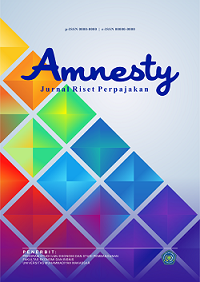Terms and Conditions for Objection, Appeal And Reconsideration in the Tax Court
DOI: https://doi.org/10.26618/jrp.v6i1.10814
Dispute, Objection, Appeal, Judicial Review
Abstract
This study aims to explain the terms and conditions of objection, appeal and review. The legal remedy that can be taken by taxpayers in the event of a tax dispute is by filing an objection. if you feel dissatisfied with the results of the objection, you can proceed by filing an appeal to the tax court. In principle, the tax court's decision is final and has permanent legal force, nor can a lawsuit be filed in a general court, state administrative court, or other judicial body. However, if the disputing parties are dissatisfied with the tax court decision, it is still possible to take the last resort in the form of extraordinary legal remedies, namely by submitting a judicial review of the tax court decision to the Supreme Court.References
Adil, M. (2022). Accountability and Transparency in the Public and Private Sector. International Journal Of Humanities Education and Social Sciences (IJHESS), 1(6).
Adiningrat, A. A., Ruhayu, Y., Rustan, R., Wahyuni, S., & Fitrianti, A. N. (2022). The Effect of Financial Literature and Islamic Work Motivation on the Performance of Food Micro, Small and Business Enterprises (MSMEs) in Makassar City. Budapest International Research and Critics Institute-Journal (BIRCI-Journal), 5(4), 30836-30845.
Adiningrat, A. A., & Warda, W. (2023). The Development of Intensity Model on Technopreneurship to Improve Turnover in Micro, Small and Medium Enterprises (MSMEs) Culinary in Makassar, Indonesia. International Journal of Economics Development Research (IJEDR), 4(2), 218-228.
Abdi, M. N., Suarni, A., & Arham, A. (2022). Analisis Kepailitan Perusahaan Yang Tercatat di BEI Sub Sektor Telekomunikasi. Jurnal Multidisiplin Madani, 2(6), 2705-2716.
Arman, A. (2021). Analysis of Motor Vehicle Tax Revenues before and after the Tax Kring. Point of View Research Accounting and Auditing, 2(2), 144-149.
Arman, A., & Mira, M. (2021). Does Tax Avoidance Make Do Earning Opacity?. Atestasi: Jurnal Ilmiah Akuntansi, 4(1), 88-95.
Arman, A., Mira, M., Masrullah, M., Agustan, A., Firmansyah, F., & Aditya, R. (2023). Financial Literacy and Assistance in Compiling Independent Financial Reports Using Expense IQ Money Manager. Technium Sustainability, 4, 7-12.
Arsal, M. (2021). Impact of earnings per share and dividend per share on firm value. ATESTASI: Jurnal Ilmiah Akuntansi, 4(1), 11-18.
Arsal, M., & Arsal, D. (2019, August). Urban forest and financial resources perspective in Indonesia. In IOP Conference Series: Materials Science and Engineering (Vol. 593, No. 1, p. 012006). IOP Publishing.
Arsal, M., HAMID, N. I. N. B. A., Arsal, R., & Basri, M. (2014). Consumer Behavior of the Islamic banking. International Journal of Science Commerce and Humanities, 59-64.
Arniati, A., Arsal, M., Akhmad, A., Asdar, A., & Adiningrat, A. A. (2020). Impression of Student Knowledge on Decisions Become a Customer of Islamic Banks. International Journal of Business Economics (IJBE), 1(2), 145-152.
Hutagaluh, O., Rustam, A., Sangadji, S. S., Baharuddin, I., & Kurniullah, A. Z. (2020). Responsive Leadership in Preventing Transmission of Covid-19 in the Indonesia-Malaysia Border Area.
RUM, M., ARSAL, M., KHALID, A., & AWALUDDIN, M. (2023). The Distribution of Tax Collectability, Quality of Tax Services Efforts to Tax Coverage Ratio. 유통과학연구 (JDS), 21(6), 107-117.
Rustan, R., Adiningrat, A. A., & Aisyah, S. (2023). Optimizing of Resources Utilization Through Islamic Spiritual Entrepreneurship to Improve The Welfare of Coastal Communities. International Journal of Economics Development Research (IJEDR), 4(2), 170-180.
Rustan, S. A., Aisyah, S., Adiningrat, A. A., Rustam, A., & Anggoro, M. Y. A. R. (2022). Strengthening Of Marketing Information Systems and Accounting Information Systems for Micro Small and Medium Enterprises (UMKM) Food Culinary Makassar. Budapest International Research and Critics Institute-Journal (BIRCI-Journal), 5(4), 30580-30585.
Suarni, A., & Amelia, R. (2023). Analysis of Mosque Financial Management in Ujung Bulu District, Bulukumba Regency, South Sulawesi, Indonesia. Public Sector Management and Accounting Research, 2(2), 10-22.
Khalimi (2017). Penyelesaian Sengketa Pajak melalui Keberatan dan Banding. Jurnal Penelitian Hukum Legalitas Volume 11 No.1 Januari 2017. ISSN 1411-8564 hh. 1 – 6.
Resmi, Siti. (2019). Perpajakan: Teori dan Kasus Jakarta: Salemba Empat
Peraturan Mahkamah Agung Republik Indonesia Nomor 7 Tahun 2018 tentang Tata Cara Pengajuan Permohonan Peninjauan Kembali Putusan Pengadilan Pajak
Pamungkas, H. (2011). Penyelesaian Sengketa Pajak. Binus Business Review, 2(1), 551-563.
Rachmawati, A. R., & Sariono, J. N. (2011). Upaya Hukum Wajib Pajak Atas Surat Ketetapan Pajak Kurang Bayar Yang Ditetapkan Oleh Fiskus Dalam Pemenuhan Hak Wajib Pajak. Perspektif, 16(4), 196-213.
Budiono, Abdul Rachmad. 2005. Pengantar Ilmu Hukum, Malang: Bayu Media Publishing.
Ilyas W. B. and Burton R. (2012) Manajemen Sengketa dalam Pungutan Pajak. Analisis Yuridis terhadap Teori dan Kasus. Jakarta: Mitra Wacana Media.
Dimyati, Ahmad (2014). PENGAJUAN KEBERATAN, BANDING, DAN PENINJAUAN KEMBALI TAGIHAN BEA
MASUK,https://bppk.kemenkeu.go.id/sekretariat-badan/berita/pengajuan-keberatan-banding-dan-peninjauan-kembali-tagihan-bea-masuk-820597, diakses pada 04 Desember 2022 pukul 15.00
Undang-Undang Dasar Negara Republik Indonesia 1945.
Undang-undang No. 14 tahun 2002 tentang Pengadilan Pajak.
Undang-Undang Nomor 10 Tahun 2008 tentang Pemilu anggota DPR DPD DPRD.




